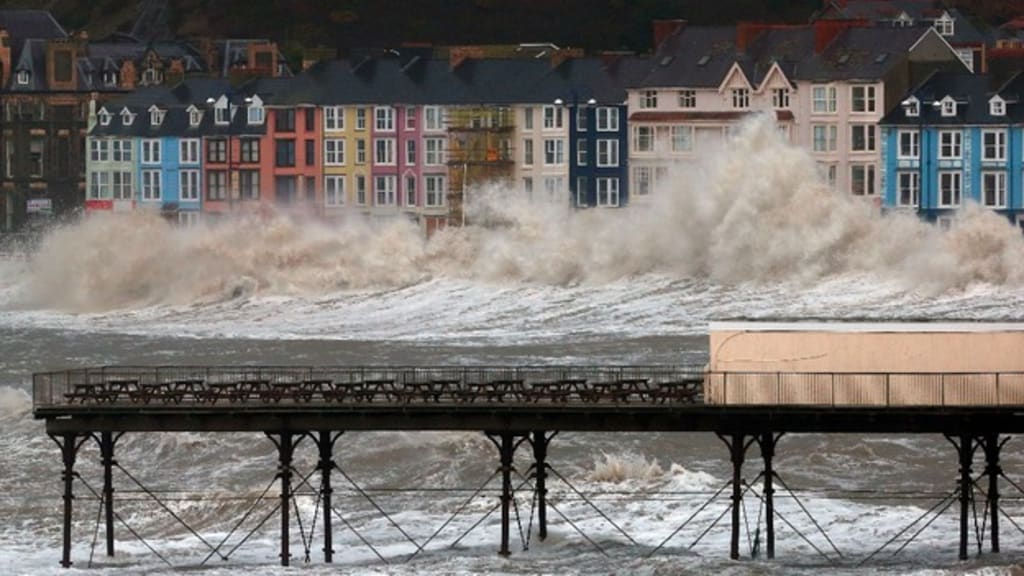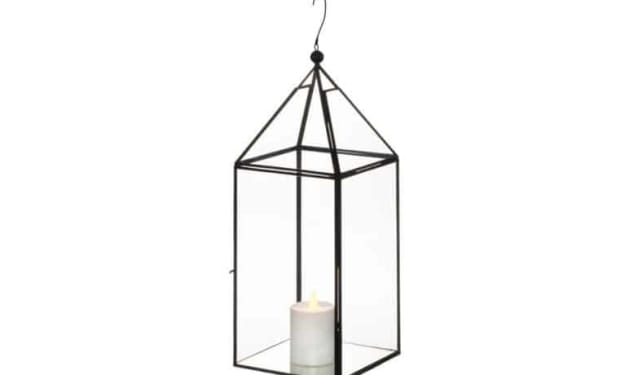Aberystwyth
Time is a trickster; a bulbous, jellified liquid that shifts and morphs and toys gleefully with us all.

I had been entirely alone in the carriage when the clunking electric mechanism of the hissing door alerted me that someone else was entering.
I looked up from my book and read the broad sign on the platform – Bow Street.
Beyond the sign, in giant, ugly letters on the side of a pretty little white farmhouse, someone had scrawled in black paint, WELCOME TO HELL. The sentiment was so far displaced that I laughed aloud to myself.
It was a lone man who had entered the carriage. I glanced briefly at him – young, heavy set – stubble, slightly bucked teeth and a mess of unkempt black hair. He was wearing an off-brown waterproof coat, zipped to the top. Cheap jeans and cheap clunky black shoes. His manner seemed clunky too as he fumbled between the seats like an ogre in a heavy shuffle. He swung his black backpack down on a seat opposite my own. Why? I grimaced internally. It was an empty carriage.
I smiled politely at him and then focused my eyes determinedly again to the words on the page of the open book in front of me.
‘Not very nice out there tonight.’
‘No.’ I looked up briefly before returning my gaze fixedly to the book, making no attempt to conceal my irritation.
‘What are you reading?’ Really?
‘Coleridge’s Rime of the Ancient Mariner’.
‘Ah – ‘ a pause. ‘Any good?’
The question was so asinine that I was at a loss as to how to respond.
‘It’s OK,’
‘Let me guess,’ he smiled stupidly, assessing me through his gawps, ‘You’re a student – on your way to Aber.’
‘Yes.’
‘I live there – just on my way back from seeing a friend today. Do you like it?’
‘It’s OK.’
He finally stopped talking then but his presence was distracting and I could no longer concentrate on the poem. I continued to stare at the pages anyway.
I was relieved when a voice rang out over the tannoy. I yawned. It was dark. ‘Coleridge.’ I thought to myself, raising an eyebrow, as I half-heartedly closed the book, and softly fingered the embossed image of a great, white albatross in flight on the cover before tossing it into my bag. My forehead met with a sharp chill as I leant against the window. Thousands of raindrops hung and dripped on it; glowed a dim sort of orange from the station lights, against a heavy-set blanket of impenetrable blackness.
‘We are now approaching Aberystwyth,’ the faceless, imposing voice of the tannoy announced. ‘This is Aberystwyth – where this service terminates. Please remember to take all of your personal belongings with you when you leave the train. Please mind the gap between the train and the platform edge.’
Another voice then rang out relaying what I assumed was the same message in Welsh. I opened up my pewter cigarette case and carefully removed a slender white cigarette before replacing it in my coat pocket. Everything always felt heavy then, somehow. Tempestuous. Life heaving through endless wind and rain and an infinite spectrum of grey.
It was that that had brought me here - the strong, tyrannous pull of the storm-blast – the thick, and utterly compelling uncertainty.
It was nine pm.
‘Well, I guess we’re here,’
‘I guess so,’
Christ, I hope he doesn’t follow me or something.
‘Let me just give you this, I think it will help you.’ He stretched out his hand and offered me what looked like a pamphlet. I took it.
‘Thanks,’
‘Well, God bless you. Don’t get wet!’ With that, he swung on his rucksack and stumbled back along the carriage.
I looked down at the small tract that had materialised in my hand. The front page was blank but for a single question: Does your life have true meaning? I felt my face contort into a grim smile and let out a brief, audible laugh before abandoning the leaflet on the seat for other travellers.
I picked up my hefty bag with a small grunt, hulked it to the end of the carriage and stepped onto the platform. Fortunately the man seemed to have gone.
Here again. It was cold out and I shivered. Resignedly, I lit my cigarette and started a slow, ponderous walk to the seafront in the rain.
When I returned, after some thirteen years, I again alighted the train a little after nine. However, it was July and the weather temperate. I stepped off in a daze, after having watched snippets of worlds flicker past me out of the window – as images on a camera roll being played in fast-forward. I had seen the imposing majesty of Heidi’s mountains. Hansel and Gretel’s endless forest of conifers unfurled in swift, sharp blasts. I had pondered the story of the little white church that stood entirely alone amidst an infinite landscape of a hundred greens. I saw it only for a second. Who worshipped there?
The evening – heavy still – was full of thick, milky pink-hued twilight, and so, as I took my first few steps out of the station the prospect of the streets were at once both familiar and unfamiliar. I lit a cigarette.
Here again, winding through narrow streets I did and did not recognise; shopfronts unchanged in over a decade – idiosyncratic nick-nacks and souvenirs - antiques in windows I became sure had never moved at all. Distinctive items – a slumped, downbeat marionette; a glass ashtray printed with a map of Wales. Were these real memories? A swell of uncertainty loomed suddenly around me and within it – somehow – an air of comfort.
Lost in time; it was a little blip of a place sitting quietly and secretly between the vast Welsh mountains and the vast Irish Sea. That was why I had gone there. It was a place to linger.
The students had already left for the year and no-one seemed to have any place to be. Couples and families wandered sparsely along the quiet streets, slowly and without purpose. The only unrest was in the sharp and definitive screeches of the gulls; argumentative, angry creatures destined, it seemed, to spend their existence in a state of perpetual disagreement and with permanent frowns on their perturbed, down-turned faces.
Dusk. As I walked I considered the way in which the shadows and half-light of twilight and of night had become a place of immeasurable security for me and for a moment I revelled; in thoughts of dense, consuming rainfall; solid-black nights and green, thorny explosions of flora that burst out in an instant; in the power and authority of mountainous clouds dominating the sky and casting shadows over the earth.
The whole universe had somehow split open in front of me – unpacked itself artfully, methodically – unfolding – piece by piece - and in the centre of it I floated; consumed in endless space, so small, so uncertain.
After a walking for a moment or two, past sandwich-shops named after Roman warriors; coffee shops with quaint net curtains framing the windows; distinctive basement pizzarias; I reached a crossroads. Even the cars navigating the peculiar roads moved at a pace to suggest they did not wish to miss the serenity of the evening.
The world had mutated away from me; stalled; glitched. I stopped walking momentarily at the sight of a café with harsh, creaky aluminium furniture outside. Bad coffee, uncomfortable chairs. How many cigarettes had I smoked there? How many books had I read? And how is it that moments can emerge and froth and subside like waves themselves – rising, crashing, collapsing in an endless, reliable, chaotic rhythm? Constant, enduring yet wholly volatile.
These thoughts loitered as I continued my inevitable walk toward the seafront. Why does the sea so attract us? When we arrive close to it after any period of absence its pull is magnetic. To the sea. Soundtrack of voracious gulls; a permeating mist - salty, off-cabbage – an inherent, earthy smell, which seems to sneak up on you then refuses to go. Hippocampus crack. That repetitive psssshhhhhhhhhhh-pppfffffffff, psssshhhhhhhhhhh-pppfffffffff of the ceaseless tide. In, out; in, out; in, out. We like the sea, I theorise internally, because it reminds us of how small we are. These markers revealed themselves inevitably around me. One-by-one and all at once together.
Hiding behind the narrow streets of the town and casting the evening in this shadowy pink – the seafront vista appeared quite suddenly before me. I froze. I had no notion that the sun should set here. To me, it was perpetually black, or grey and day became night or night became day. There had never been this transition – I was sure – or this colour.
It was alarmingly pink. All-consuming, vibrant, spectral orange-pink - the whole sky – and reflected from that – the whole sea; friendly and sparkling – hospitable. An idyll; a postcard.
A few people were scattered about the front in a calm, respectful reverence of this event. A young couple, a few meters to my right were taking pictures in front of it.
I stood, and watched - with detachment.
I had not come here to seek out beauty – certainly not postcard-beauty - on any occasion. The fragmentary sense of displacement, however, seemed appropriate. It was very quiet.
I stood, and watched.
The evening melted on, collapsing slowly and deferentially into its own glory as I walked along the promenade. Along it stood a great row of tall magnificent, Victorian houses, with braying bay windows and multi-flue chimneys – those houses one only sees near the seaside. Pink, blue, yellow – some old white, flecked with specks of dirt-brown where the paintwork had peeled away. Cardboard No Vacancies signs hung in the glass of some windows and some residents hung about their curtains, taking advantage of their sea views.
I arrived quite suddenly at the house that for a brief time had been my home.
It occurred to me then that this had never been a place of tender sunsets and warm summer strolls. To me it had been a perpetual storm; battering and brutal and unrelenting. It was dark and the sea and the wind and the rain fought in a violent brawl, ever engaging; crashing, spitting, raging – hammering the carefully-chosen paint of these houses; each contender a warrior matched equally with the others in strength and resolve – a vicious stalemate of force and callousness.
Existing alone at the mercy of those hostile elements was a like a liberation. Even the looming, deformed, black-toothed rocks of the cliff-face at one end of the bay could not withstand these beasts; nor the brave castle at the other – standing with dignity still, but bruised and beaten and unrecognisable. A failed fortress against the assault and power of time and wind and rain. Heroic too, in its way, for there it still stood.
I suddenly felt tired. As I meandered back through the streets I continued to seek an answer to the question of why I had decided to return there that weekend.
After some difficulty navigating the streets, I finally found the guest-house I had booked myself into.
An appropriate anachronism – it was an arresting Victorian house, painted yellow, peeling wooden sash windows. The creaking, fragile glass of the porch seemed inadequate. It contained that musty redolence that builds and lingers with memories; engrained deeply in the cold, ornate tiled floor, the wood of the bannister and the decorative cornice. The whole building creaked with the weight of memories, even on that temperate July evening and before I fell, heavily into a deep, dreamless sleep that night I tried to imagine what it would be like to stay there during a storm.
I did little during the weekend but for walking and lingering in the quiet anonymity I had only ever experienced there. However in a pleasing and ironic passing of threads, I did have an encounter that seemed – though it probably doesn’t – to hold some significance.
I was walking quite aimlessly down the street that curves toward the pier. On the very corner was a Greek restaurant – painted marigold-yellow - that evidently existed, like many things there, outside of time.
As I approached, dreamily, I was brought back into the present by the sound of a breathless, angry voice – proclamatory and faltering in equal measures.
‘For God so loved the world,’ the angry and unkempt man bellowed into the street through a microphone, ‘that He gave His only begotten Son, that whoever believes in Him should not perish but have eternal life’.
It was twenty-seven degrees but I shivered slightly through my smirk. I walked past, down to the black railings lining the promenade and perched some metres away beside the pier to listen. I lit a cigarette to disguise my interest.
‘Are you a person?’ the angry man asked – to everyone; to no-one. ‘Are you a person?’
‘No,’ laughed a little voice that emerged from a party ambling by, indifferently licking soft, creamy, tasteless 99s.
‘Then that makes you a liar. Do you know what happens to liars? Have you read the book of Revelation? Do you know what happens to liars? Do you? They go to hell and burn in fire and brimstone. Have you read Revelation?’
The boy who had replied, sauntering leisurely along the promenade with his family, could have been no older than ten and by the time this outburst had concluded, was already out of earshot.
I continued to watch and listen covertly, taking slow, steady drags on my cigarette. As I watched, I became aware that the hissing spittle of this man’s anger was flecking past slightly bucked-teeth; that this furious, wavering voice matched that of the smiling, dumb-faced young man from the train carriage thirteen years earlier. He must have been eroded with bitterness, it occurred to me, after a decade of such encounters. Surely, I thought to myself, it would have been in God’s best interests to have made him just a little more affable?
Listening to his vacillating ramble made me feel a little sad, and after I while I picked myself up and continued slowly back along the promenade in the opposite direction.
For the rest of the trip I pondered the extent of this man’s anger and resentment. And I pondered the messages that had permeated my childhood. And I immersed myself, momentarily, in memories of trying to stifle fits of giggles in church on a Sunday morning. Of the wingspan and ferocious frown of a taxidermal albatross at a museum in Worcester on a school trip in the late nineties (I think it’s still there now). Of that distinctive feeling – a fear of hell - and the taste of stale custard creams after a Sunday morning sermon. Of a down-trodden, dust-laced marionette in a shop window. Of the faint crackle at the end of a cigarette being lit after a long train journey. Time is a trickster; a bulbous, jellified liquid that shifts and morphs and toys gleefully with us all.
At once and together I was reading Coleridge on the train; giggling in church; floating along that promenade in all weathers, simultaneously – navigating those strange little streets at night over and over and over again as though weaving through the threads of time itself. I was averting my eyes away from a stranger on a train. I was sitting, disillusioned, in the basement of the little bar on the corner, painted pink, blaring thud of music. There were no windows but I knew it was raining heavily because it always did. I was walking past it, deliberately and walking past it accidentally. The sun was blazing. Here I am again on the corner and how did that street lead me here? Another trick. The mischievous little streets had realigned themselves again when I wasn’t looking.
Aberystwyth. What more can be said but that it: has been, is, will be - which is about as much as one’s understanding can allow for anything?
And now this spell, was snapt: once more
I viewed the ocean green,
And looked far forth, yet little saw
Of what had else been seen –
Coleridge. I frowned, and turned the page. I’d be there soon.
Present day – or at least it was then – and I alighted another train. Home now.
Turning out of the station, I stepped onto a street along which I must have walked a thousand times. But that afternoon it seemed to greet me with an unexpected and faintly insidious air of unfamiliarity.
I lifted my lighter up toward my lips and lit a cigarette.
About the Creator
Beth Sarah
We've been scribbled in the margins of a story that is patently absurd






Comments
There are no comments for this story
Be the first to respond and start the conversation.